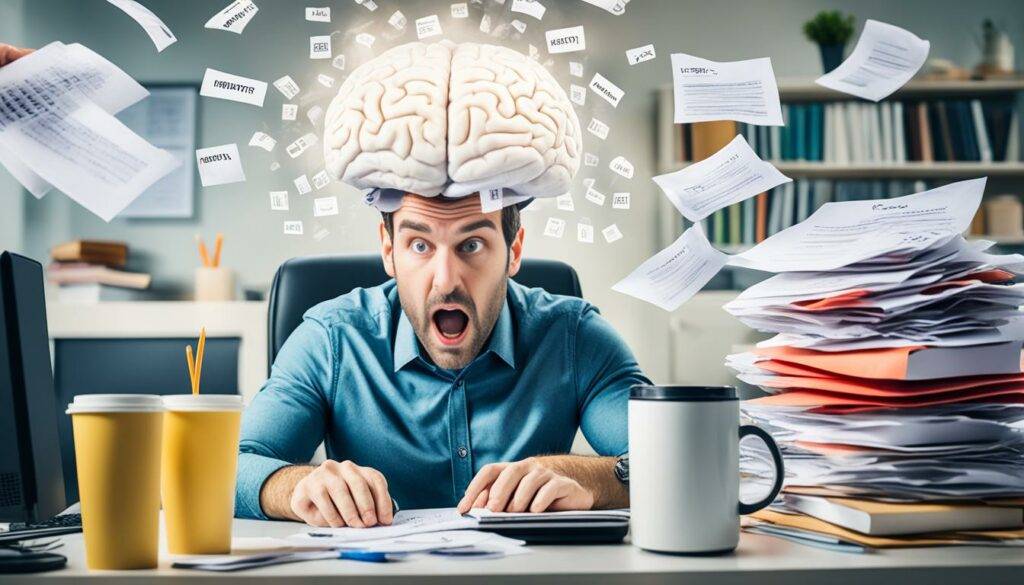“The mind is everything. What you think, you become.” – Buddha. This saying shows how important mental clarity is. In today’s fast world, it’s key to stay sharp. Many people struggle with distractions and too much information, leading to brain fog.
Learning how to clear your mind can change your day. It helps with making decisions and staying sharp. If you often forget things, or struggle to remember names, it might be due to a lack of clarity. Stress can make it worse, showing why managing stress is important.
Not getting enough sleep also hurts your brain’s ability to clean out toxins. This leads to feeling tired and less sharp. But, there are easy ways to help clear your mind. You’ll find simple tips and techniques to help you stay focused and sharp!
Key Takeaways
- Lack of mental clarity can lead to forgetfulness and cognitive issues.
- Chronic stress negatively impacts cognitive function.
- Sleep deprivation hinders the brain’s ability to remove neurotoxins.
- Regular physical activity enhances blood flow to the brain.
- A balanced diet rich in fruits, vegetables, and whole grains supports mental clarity.
- Mindfulness practices can significantly reduce mental clutter.
- Striking a work-life balance is essential for maintaining mental clarity.
Understanding Mental Clarity
Being mentally clear means your thoughts are clear, your focus is sharp, and solving problems comes easily. This state boosts your productivity, happiness, and confidence.
Defining Mental Clarity
Mental clarity is key for quick thinking and making good decisions. When you’re clear-headed, you can focus better and dive deep into tasks. You can improve this clarity with techniques that make your mind sharper, helping you handle life’s challenges better.
The Importance of Mental Clarity
Mental clarity is very important. It helps you face challenges with ease and stay strong against stress. Without it, you might feel overwhelmed, which can hurt your mood and mental health. There are many ways to boost your focus and calm your mind, like meditation to help you pay attention and feel less anxious. Working on mental clarity can lead to personal growth and a better life. For more tips on mental strategies, check out this resource.
What Causes a Lack of Mental Clarity?
A lack of mental clarity can come from many sources. It’s important to know what causes brain fog to find ways to beat it. Things like lifestyle, health issues, and emotional challenges can make it hard to think clearly.
Common Triggers for Brain Fog
Many things can cause brain fog, including:
- Poor sleep quality: Getting 8–9 hours of good sleep each night is key. Not sleeping well can hurt how well you think and reason.
- Chronic stress: Stress can make you feel tired and hard to focus. It’s important to manage stress to stay sharp.
- Nutrient deficiencies: Not having enough vitamins like B12, Omega-3 fatty acids, and magnesium can hurt your thinking skills.
- Medical conditions: Some health issues like chronic fatigue syndrome, fibromyalgia, and autoimmune diseases can make brain fog worse.
- Certain medications: Some medicines can cause brain fog as a side effect. Talking to your doctor about other options might help.
The Role of Stress and Sleep in Mental Sharpness
Stress and sleep are very important for staying sharp mentally. Chronic stress can use up your brain’s resources and hurt focus over time. Hormonal changes during pregnancy or menopause can also affect how well you think.
Getting good sleep is crucial for your brain’s health. Studies show that exercising regularly and eating well can help clear brain fog. By taking care of these areas, you can improve your mental clarity.

For more on improving your mental and physical health, check out ways to boost your mental wellbeing.
How to Improve Mental Clarity
Improving your mental clarity is key to doing your best in life. By adopting certain habits and techniques, you can greatly improve your focus. These strategies will help you boost your brain power and keep your mind sharp.
Strategies for Enhancing Focus and Concentration
Start your journey to better mental clarity with simple yet effective mental sharpness techniques. Getting enough sleep, managing stress, and cutting down on digital distractions are important steps. Aim for 7-8 hours of sleep each night and tackle your toughest tasks when you’re most alert.
- Engage in brain exercises, such as puzzles or memory games, to stimulate cognitive enhancement.
- Incorporate regular breaks into your work schedule to rejuvenate your mind and maintain high concentration levels.
- Limit screen time and minimize exposure to electromagnetic radiation from devices.
Implementing Mindfulness for Clarity
Using mindfulness for clarity can change the way you think. Activities like meditation and deep breathing help clear your mind. This leads to better focus and decision-making. Positive thinking also helps you handle challenges more clearly.
Regular mindfulness practice improves focus now and in the future. As you meditate or practice mindfulness daily, you’ll get better at handling complex situations. For more on these helpful habits, check out this link.
Effective Techniques for Cognitive Enhancement
Improving your brain power needs a mix of exercise and good eating. Regular physical activity boosts your mental skills. It helps nutrients get to your brain better.
Physical Activity as a Brain Booster
Exercise does more than just make your body strong; it also sharpens your mind. Walking, dancing, or tai chi can make your memory and thinking better. People who exercise often feel less stressed and sharper mentally.
Adding brain games like chess or puzzles to your exercise routine can also make you smarter.
Nutrition’s Role in Mental Sharpness
Eating right is key to clear thinking. Foods full of fruits, veggies, lean meats, and whole grains help your brain work well. Omega-3 fatty acids and vitamin B-12 are especially good for your memory and thinking.
Drinking enough water is also crucial since your brain is mostly water. Good food and water help your body and brain stay sharp, fighting off brain fog.

| Activity/Food | Benefits |
|---|---|
| Walking | Boosts circulation and reduces stress levels |
| Tai Chi | Enhances brain connectivity and cognition |
| Omega-3 Fatty Acids | Supports memory and cognitive operations |
| Fruits & Vegetables | Provide essential vitamins for brain health |
| Hydration | Prevents cognitive decline and enhances focus |
Natural Nootropics and Brain Fog Solutions
Learning how to boost your brain power can greatly improve your mental clarity and performance. Natural nootropics are a great way to fight brain fog. By adding these supplements and foods to your diet, you can help keep your mind sharp.
Using Supplements to Improve Mental Performance
Natural nootropics like Bacopa monnieri, Ginkgo biloba, and Rhodiola rosea can really help your brain work better. They can improve memory, focus, and mental performance. Before starting any supplements, it’s a good idea to talk to a healthcare provider to find what’s best for you.
Here’s a detailed look at some popular natural nootropics and their benefits:
| Supplement | Benefits |
|---|---|
| Bacopa Monnieri | Enhances memory and cognition, reduces anxiety. |
| Ginkgo Biloba | Improves blood flow to the brain, potential benefits for dementia. |
| Rhodiola Rosea | Reduces fatigue, boosts mental performance under stress. |
| Caffeine | Increases alertness, combats fatigue. |
| L-Tyrosine | Supports neurotransmitter production, enhances focus. |
Everyday Foods That Foster Cognitive Function
What you eat affects your brain health. Eating foods that help your brain can improve your mental performance now and in the future. Foods like berries, fatty fish, walnuts, and dark chocolate are packed with nutrients and antioxidants that are good for your brain.
Here is a list of remarkable foods to include in your diet to enhance cognitive function:
- Berries: Rich in antioxidants that protect against oxidative stress.
- Fatty Fish: High in omega-3 fatty acids, crucial for brain development.
- Walnuts: A great source of healthy fats and vitamin E.
- Dark Chocolate: Contains flavonoids that boost mood and improve learning.
Conclusion
Getting a clearer mind is a journey with many steps. It’s about making changes in your life. Focus on getting enough sleep, eating well, and staying active to boost your brain power. Every step you take helps you become sharper and more focused.
Using mindfulness, meditation, and good stress management can really help your thinking. It’s important to know what affects your mind and deal with it. Managing stress and building mental strength can greatly improve your mental health.
The path to a clearer mind is full of possibilities. Eating right, exercising, and being mindful can open up new benefits. Check out this helpful resource to find ways to improve your mental sharpness.
FAQ
How can I improve my mental clarity?
To boost your mental clarity, make sure you get good sleep and manage stress well. Also, limit digital distractions and try mindfulness practices. Don’t forget to stay active physically.
What are some effective brain fog solutions?
For brain fog, eat a balanced diet and drink plenty of water. Exercise regularly and try mindfulness like meditation and deep breathing.
Can natural nootropics help with cognitive enhancement?
Yes, natural nootropics like ginkgo biloba and Rhodiola rosea can boost your brain function. They help with brain fog. But, talk to a doctor before using them.
What role does nutrition play in mental sharpness?
Nutrition is key for a sharp mind. Eating foods rich in omega-3s, antioxidants, and vitamins from fruits, veggies, and fatty fish helps your brain work better. It fights brain fog too.
How does stress affect mental clarity?
Too much stress hurts your focus and uses up your brain’s resources. It makes it tough to stay clear-headed. Use mindfulness and exercise to keep your mind sharp.
What mindfulness practices can I use for better clarity?
Try meditation, focused breathing, and journaling to clear your mind. These practices help you focus and make better decisions over time.
Are there specific foods that boost cognitive function?
Yes, eating foods like berries, fatty fish, walnuts, and dark chocolate helps your brain. They’re full of antioxidants and healthy fats that support brain health.




























































